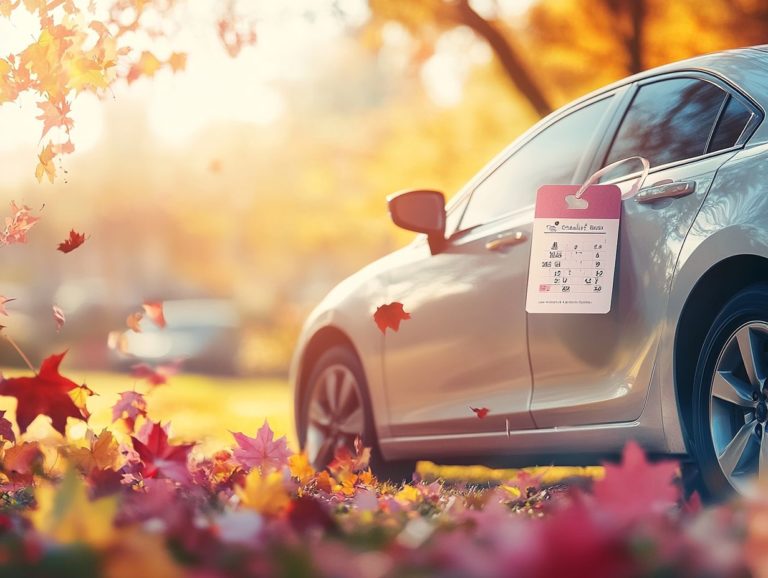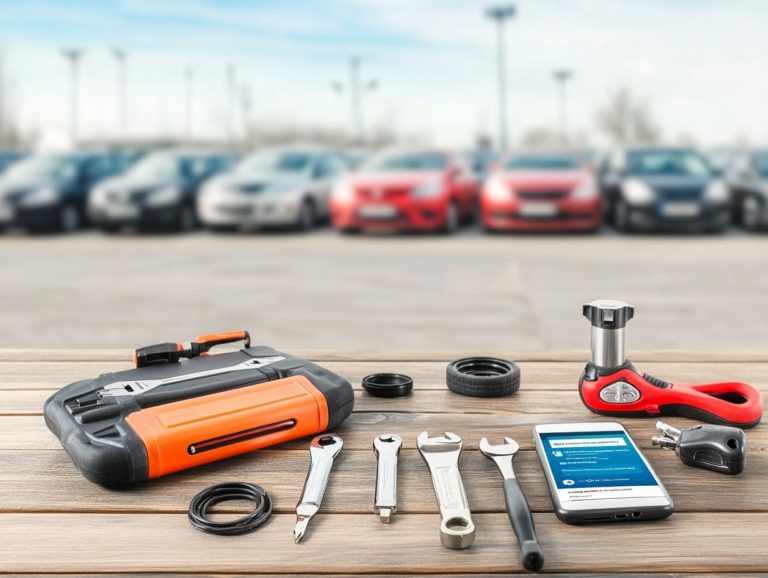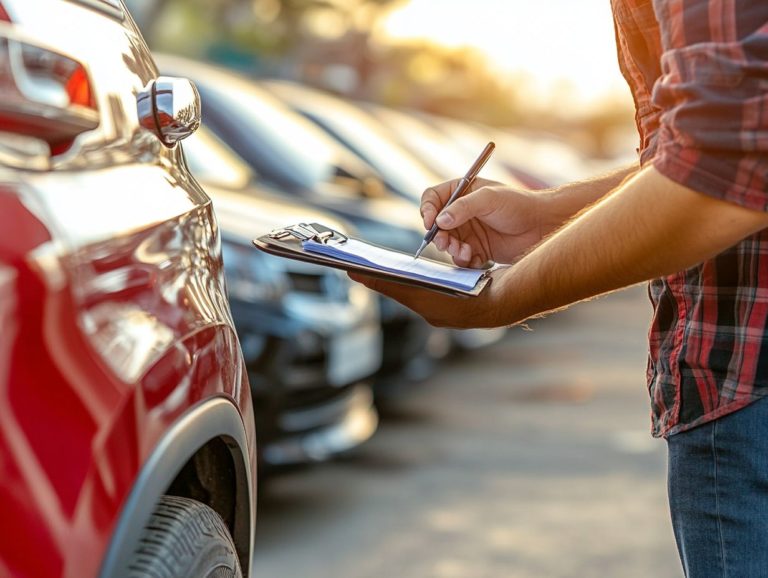Tips for Buying Used Cars at Auctions
Thinking about buying a used car? Car auctions can be a hidden gem, offering substantial savings and a diverse selection of vehicles.
This guide will walk you through everything you need to know, from understanding the advantages of auctions to preparing your budget and effectively researching vehicles.
You ll discover essential tips for successful bidding, learn how to inspect and test drive your potential new car, and explore the final steps to seal the deal.
You will also receive important post-purchase advice to keep your new ride in top condition. Get ready to navigate the world of auctions with confidence and savvy!
Contents
- Key Takeaways:
- What to Expect at Car Auctions
- Benefits of Buying Used Cars at Auctions
- Preparing for a Car Auction
- Tips for Successful Bidding
- Inspecting and Test Driving Used Cars
- Finalizing the Purchase
- Post-Purchase Tips for Used Cars
- Frequently Asked Questions
- What are some tips for first-time buyers at car auctions?
- What should I do before attending a car auction?
- Is it important to inspect the car before bidding?
- What are some red flags to watch out for at car auctions?
- How can I prepare financially for buying a used car at auction?
- Are there any risks associated with buying a used car at auction?
Key Takeaways:
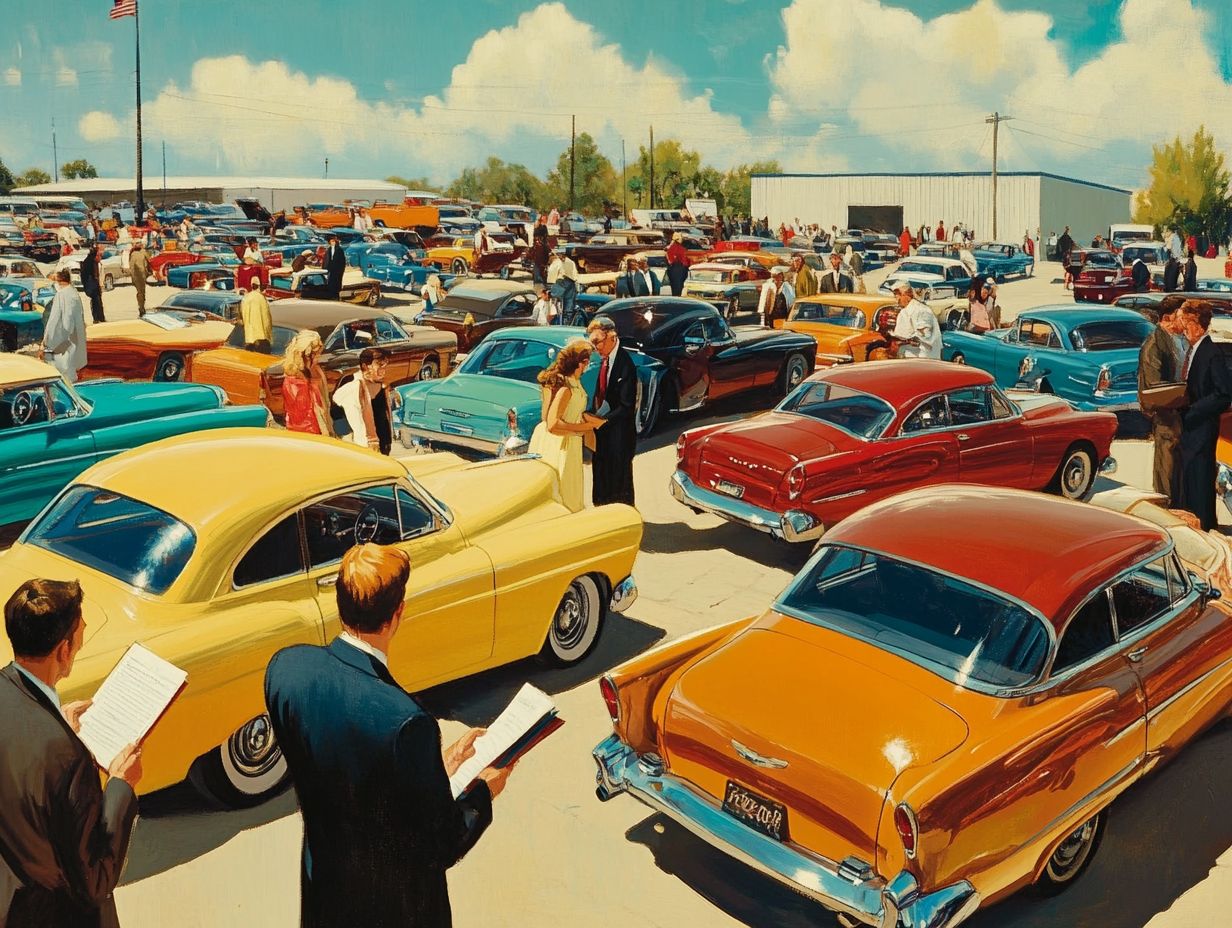
Research and budgeting are crucial for a successful car auction experience. Set a budget, research the available vehicles, and stick to your budget to avoid overspending.
Don’t get caught up in the excitement of bidding. Stay calm and have a strategy in place to get the best deal on your desired vehicle.
After purchasing a used car at auction, be sure to inspect and test drive it thoroughly. Consider factors such as the vehicle’s history, condition, and potential maintenance and insurance costs.
What to Expect at Car Auctions
Attending a car auction can be an exhilarating experience, especially for those passionate about cars or looking to find something unique.
Picture the lively atmosphere at the auction, charged with competitive bidders and the intricate auction process, where excitement and anticipation weave seamlessly together.
You ll want to complete the registration process and secure your bidding number, a unique identifier that allows you to participate in the bidding for that dream car you’ve always envisioned.
It s essential to understand the various additional costs charged by the auction house and to conduct a thorough vehicle check, ensuring that your purchasing decision is as informed as it is thrilling.
Benefits of Buying Used Cars at Auctions
Purchasing used cars at auctions offers a wealth of benefits, particularly for those looking to achieve significant cost savings.
One of the standout advantages is discovering vehicles at prices often lower than those at traditional dealerships, which may add extra costs to the final sale.
With the right auction strategies, you can navigate the bidding process effectively and land remarkable deals, especially on rare or vintage models.
Cost Savings and Other Advantages
The cost savings associated with purchasing a car at an auction can be substantial, particularly for classic car enthusiasts in search of rare finds. Auctions frequently present vehicles at prices significantly lower than those at traditional dealerships, allowing discerning buyers like you to allocate your budget more effectively.
However, it’s crucial to keep additional costs charged by the auction house in mind, as they can influence the overall purchase cost.
For example, you might discover classic models priced 20-30% less at auctions compared to retail prices, creating an excellent opportunity for savings. Auctions also feature unique vehicles that aren t typically found at dealerships, giving you access to one-of-a-kind models that may appreciate in value over time.
While it s essential to factor in any additional costs often ranging from 5-10% of the final bid many buyers still find the net savings to be significant. Recent statistics indicate that you could save upwards of $3,000 or more on your purchases, making auctions an enticing option for those diligent in their research and careful in their approach.
Preparing for a Car Auction
Preparing for a car auction is vital for ensuring a successful bidding experience while avoiding pitfalls, such as acquiring a vehicle with mechanical issues or unclear identification. To make informed decisions, consider these tips for researching used car prices.
Start by completing your auction registration; this step grants you essential access for the bidding process.
Conducting thorough background checks on the cars that interest you is crucial; it not only verifies the information but also boosts your confidence in making well-informed decisions during the auction.
Ready to uncover your dream car? Let s dive into the exciting world of car auctions today!
Research and Budgeting
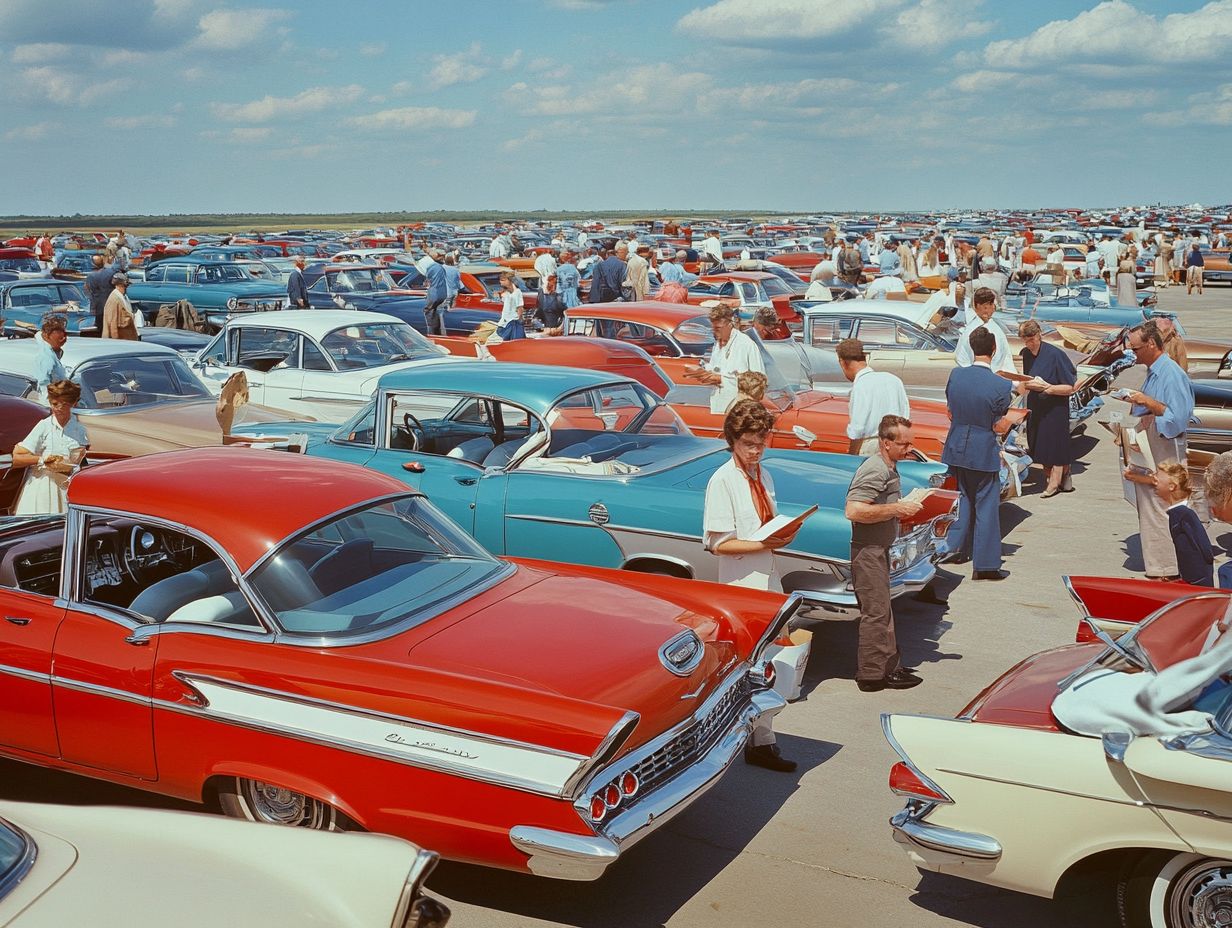
Research and budgeting are key when buying a car at an auction. They shape your bidding strategy and overall spending.
Start by setting a realistic budget. This should include not just the purchase price but also auction fees and inspection costs.
Group vehicles by price ranges. For instance, compact cars might cost between $5,000 and $15,000.
Meanwhile, SUVs and trucks could range from $15,000 to $35,000 or more based on their condition.
Once you have these price brackets, establish bidding limits to avoid overspending.
Your research shouldn’t stop at the auction. Explore market trends and historical prices online to gauge fair value.
This information prepares you for the auction, boosting your chances of landing a great deal.
Tips for Successful Bidding
Bidding at car auctions requires a strategic mindset. Consider following tips for buying used luxury cars to enhance your winning chances while staying within budget.
First, secure a bidding number. This allows you to participate actively in the auction.
Strategies for Getting the Best Deal
To get the best deal, employ specific bidding strategies. Know when to bid aggressively and when to hold back.
Research past auction results for insights into bidding patterns. This helps you know the best moments to place your bid.
Understanding bidder psychology also shapes your approach. By observing competitors, you can minimize your risk of overbidding.
Timing your bids is crucial. Waiting for the last-minute surge can give you an edge in fast-paced auctions.
Many successful bidders share stories of snagging high-demand vehicles with strategic late bids.
Implementing these strategies transforms your bidding experience and helps you secure an amazing deal.
Inspecting and Test Driving Used Cars
Inspecting and test driving used cars is essential before purchasing. This helps spot potential issues and ensures the vehicle meets your expectations.
Conduct a thorough vehicle check, including an engine report. This reveals important details about the car’s condition.
Taking the time to inspect vehicles boosts your confidence and reduces the chance of buyer’s remorse.
Key Factors to Consider
When inspecting and test driving used cars, several key factors can help you make a satisfying purchase. Start with a thorough vehicle check to look for visible signs of mechanical flaws. These might hint at underlying issues that could lead to costly repairs.
Testing the vehicle is essential; it helps uncover performance details that may not be obvious during a static inspection. This step is crucial for your auction preparation.
Pay close attention to uneven tire wear, which can indicate alignment problems that affect handling. Don’t forget to assess the brake system for responsiveness safety should always be a priority for your future drives.
Evaluate the transmission’s performance during acceleration and deceleration to understand its condition. Listen for any unusual noises that might reveal potential engine issues.
Stay sharp during the auction to make the best choice! Research the vehicle’s history, including maintenance records, for valuable insights. Familiarizing yourself with current market values will help you determine if the asking price aligns with the car s condition, guiding you to a more informed decision.
Finalizing the Purchase
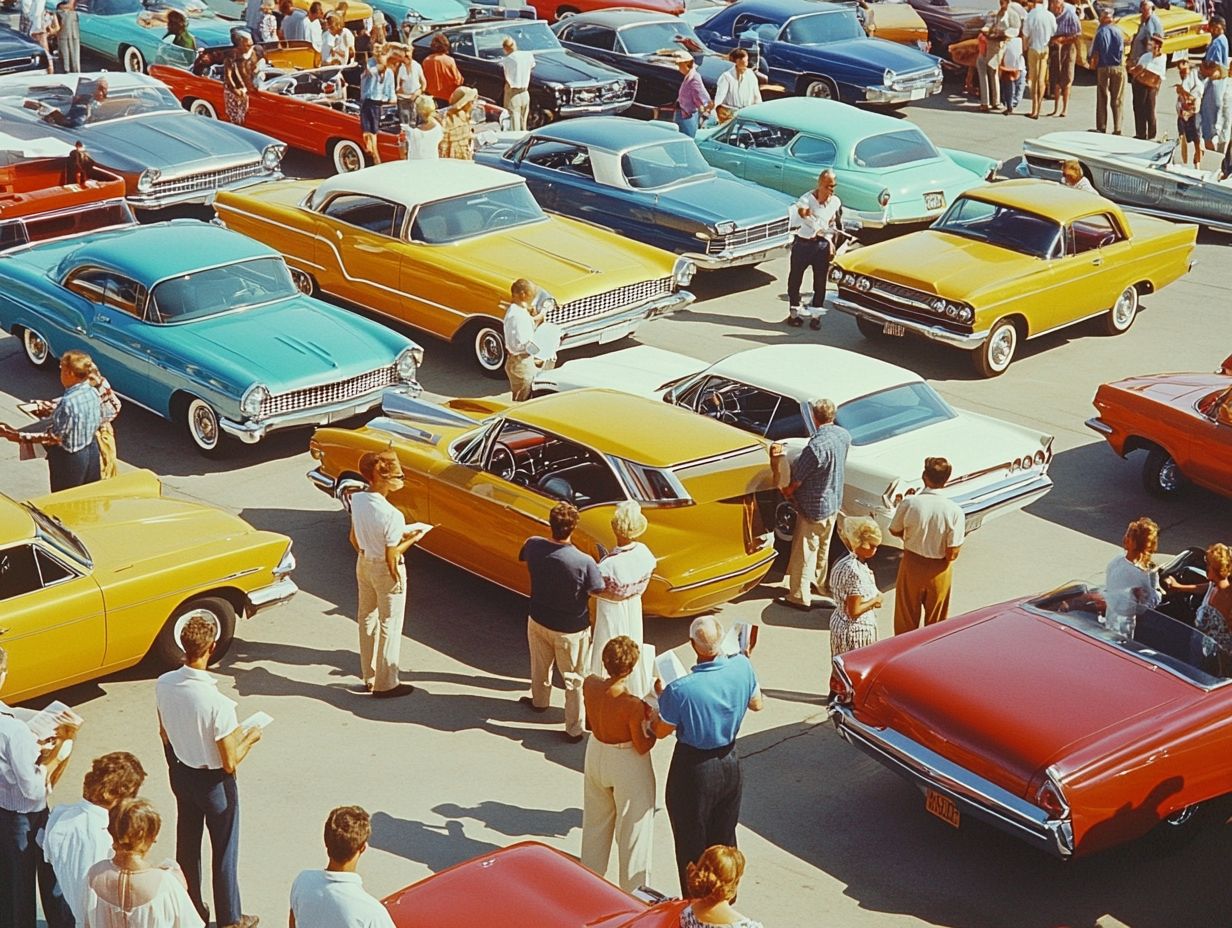
To finalize your vehicle purchase at an auction, master the essential payment processes and complete the necessary paperwork to claim your new car.
Precision in documentation is vital. Ensure that ownership transfers smoothly and all auction fees are accounted for.
Understand the auction process so you re well-prepared for the steps ahead. This will transform your journey from bidder to proud car owner into a seamless experience.
Payment and Paperwork
Understanding your payment options and the required paperwork is crucial when finalizing your car purchase at an auction. This greatly influences your overall experience.
Different auctions may offer various payment methods, such as cash, financing, or electronic transfers. Prepare accordingly for a smooth transaction.
Completing the required paperwork accurately is key to confirming ownership and grasping any auction fees that may apply. Remember, the details of each payment method can affect how quickly you can take possession of your new vehicle.
For example, cash transactions often expedite the process, while financing may involve additional steps like credit checks. Regardless of your choice, gather all necessary documents receipts, the bill of sale, and title transfer forms.
To avoid complications, double-check that all financial and legal documents are completed correctly. Store them in a dedicated folder for easy access during registration or potential resale.
Post-Purchase Tips for Used Cars
Once you’ve secured your used car from an auction, understanding maintenance and insurance considerations is essential for preserving its longevity and value.
Regular maintenance not only helps prevent issues but also enhances your vehicle s performance. Selecting the right insurance policy is equally important; it protects your investment against unforeseen circumstances.
By addressing these post-purchase aspects thoughtfully, you ll ensure effective upkeep and an enjoyable driving experience.
Now that you re equipped with essential knowledge, dive into the auction and find your perfect car!
Maintenance and Insurance Considerations
Maintenance and insurance are vital for anyone who has purchased a used car at an auction. They directly impact the vehicle’s performance and overall value.
Establishing a regular maintenance routine helps reduce wear and tear and enhances your driving experience. Choosing the right insurance coverage is also essential, as it protects against accidents, theft, or damage.
By understanding these aspects, you can enjoy your vehicle with complete peace of mind.
To keep your used car running smoothly, it s crucial to stay on top of routine tasks, such as:
- Oil changes every 3,000 to 5,000 miles
- Tire rotations every six months
- Brake inspections annually
Scheduling check-ups based on the vehicle’s age and usage can reveal underlying issues that might need attention. When it comes to insurance, assess your coverage needs by considering factors like the car s value, how often you use it, and the potential risks in your area.
Review your insurance options regularly to find the best rates and coverage plans that align with your driving habits and financial situation.
Frequently Asked Questions
What are some tips for first-time buyers at car auctions?
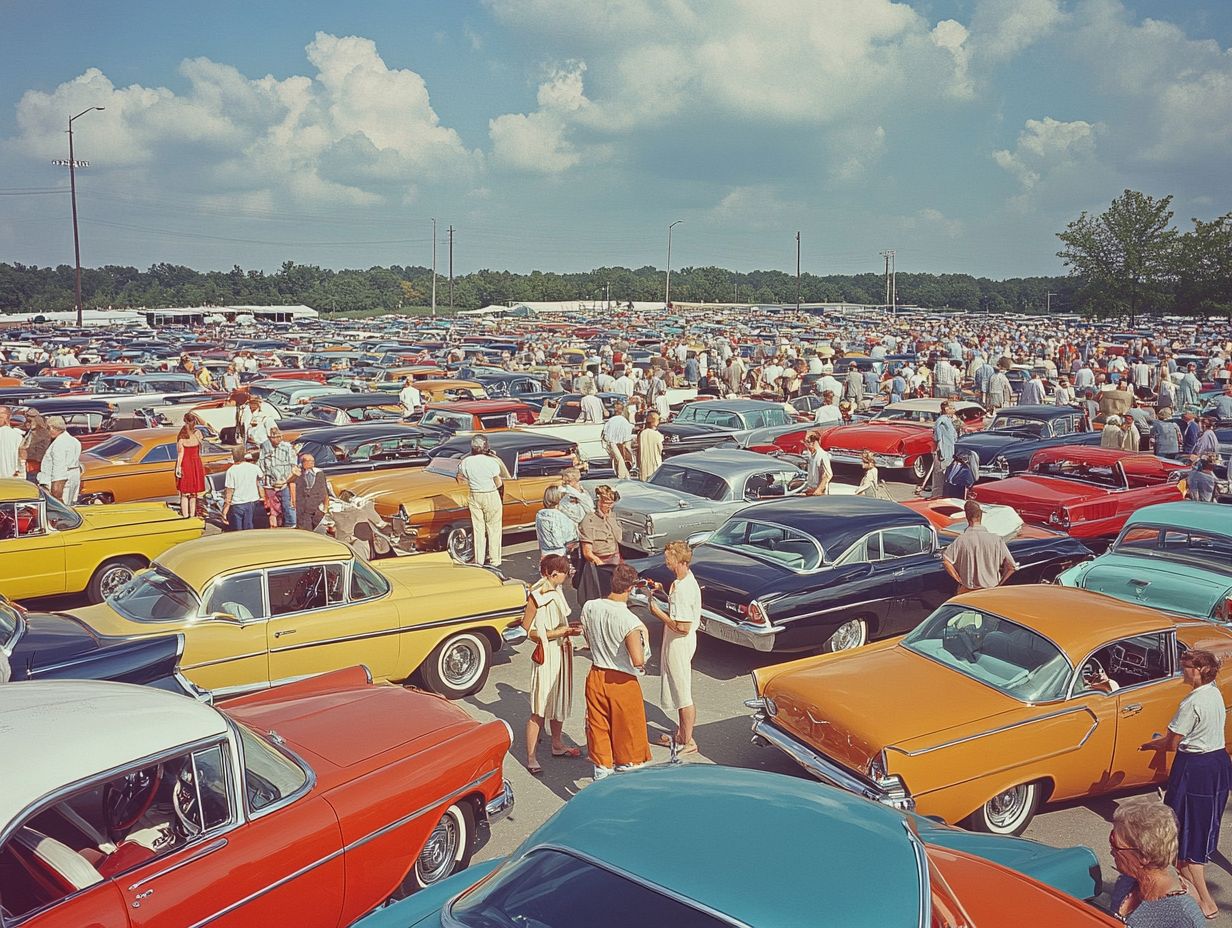
Research the market value of the car, set a budget, and inspect the car thoroughly before bidding. Attend a few auctions as an observer to familiarize yourself with the process and gain confidence.
What should I do before attending a car auction?
Before attending a car auction, research the available cars, set a budget, and get pre-approved for financing if needed. It s also recommended to bring a mechanic or someone knowledgeable about cars to help inspect the vehicles.
Is it important to inspect the car before bidding?
Yes, it s crucial to inspect the car thoroughly before bidding. This helps you identify any potential issues or damages that may affect the car’s value. Additionally, check the car’s history, including accidents or previous owners, to make an informed decision.
What are some red flags to watch out for at car auctions?
Watch for cars with no maintenance records, vehicles with a salvage title (a title given to cars that have been damaged and deemed a total loss), and cars that require significant repairs. Avoid cars that have been sitting idle for a long time, as they may have mechanical issues.
How can I prepare financially for buying a used car at auction?
Set a budget and stick to it. Factor in additional costs like taxes, registration fees, and any potential repairs. It s also wise to have financing in place beforehand, as auctions often require immediate payment.
Are there any risks associated with buying a used car at auction?
Yes, buying a used car at auction comes with risks. Most cars are sold “as-is,” meaning you may end up with a vehicle that has hidden issues or needs costly repairs. Do your due diligence and inspect the car thoroughly before bidding to minimize these risks.

